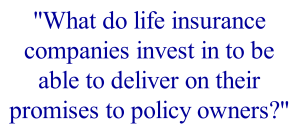A question we are getting frequently right now is how safe is your money in a Bank On Yourself plan if the debt crisis in Europe continues and spreads to the United States?
Let’s start by answering the question…

Life insurance companies are highly regulated and required to maintain sufficient reserves to ensure they can pay all future claims.
They are regularly audited by the state insurance commissioners’ offices, and sometimes by dozens of states, to ensure they are on solid financial ground. And a multi-layer safety net exists to assure your money in a life insurance policy is secure.

You may be wondering, “What about AIG?” Many people missed the fact that AIG’s problems were caused by a holding company, not its life insurance subsidiaries. Their insurance companies were walled off from the problems, have always been solvent and did not receive a bailout.
The companies recommended by Bank On Yourself Professionals are among the financially strongest life insurance groups in the world.

They enjoy some of the strongest surplus positions in the industry, approximately double the industry average.
These companies are, in essence, owned by policyowners, rather than stockholders, which allows them to focus on the long-term interests of policy holders, rather than the short-term demands of Wall Street.
Here’s what the companies used for Bank On Yourself invest in:
- Over 90% of their portfolio is invested in investment-grade fixed-income assets
- Less than 1% is invested in U.S. Treasury or other government debt
- Their bond portfolios are well diversified across many industries and companies, with no investment representing more than 1% of assets
- Due to their financial strength and reserves, they have the ability to hold on to any assets that may decline in value for many years until they recover
- They had virtually no exposure to the risky investments that caused the market meltdown of 2008
- They have NEVER missed paying an annual dividend to policyowners for more than 100 years, including during the Great Depression!
- Both your principal and gains are locked in – they don’t vanish due to a market correction
- You can know the minimum guaranteed value of your policy in any year and also the minimum guaranteed income you can take from your policy
- To find out what your bottom-line numbers and results could be with Bank On Yourself, request a free Analysis here
FREE ANALYSIS!
For these reasons – and many more – we know of no better or safer place to store your money!
The bottom line is that you have to park your money somewhere.

That could be in stocks, mutual funds, bonds, CD’s, money markets, real estate, currency, commodities… or under your mattress.

How many people have lost money in these financial vehicles, including you?
Many families’ nest-eggs have been lost in every one of these conventional investing and saving methods, dashing their hopes and dreams for a secure financial future.
As most people are aware, even putting your money into “insured” saving accounts and CD’s isn’t a sure thing; the FDIC’s insurance fund was almost $21 billion dollars in the red at the end of 2009 and the number of banks at risk of collapsing is growing daily!
Putting your money in your mattress also has its risks – it can be stolen or catch on fire. And inflation will surely make it worth less every year.
And now, we can’t even be confident that U.S. treasury bonds are a safe place to put our money.
But we challenge you to find any credible proof that anyone has lost money in a life insurance policy in the last 100 years!
For the record, the $100,000 cash reward I’ve offered to the first person to show they use a different product or strategy that can match or beat the advantages and guarantees of a properly structured dividend-paying whole life policy still remains unclaimed.
Go ahead and take the $100,000 Challenge! Because if there is a better strategy than Bank On Yourself, I want to know about it, so I can use it for my family and share it with others.
One more thing. I know some people are going to ask which companies the Bank On Yourself Professionals recommend, as discussed above.
Please understand I’m not going to list them. First, because I’m not in the business of referring any specific company. And also because it’s not enough to know which companies are the strongest and have the best product for the Bank On Yourself concept.
You also need the help and coaching of a financial representative who has advanced training in this method and knows how to structure the policy properly and how to use it to maximize your lifetime wealth.
It takes even an experienced financial representative at least a year of full-time training and experience to become proficient at this.

Experience has shown that without the guidance of a knowledgeable financial representative, there’s an excellent chance your policy will be structured wrong. As a result, it won’t grow nearly as fast, you could lose the tax advantages, or both.

That’s what led to the creation of the Professional training program, and only around 200 financial representatives across the country have passed the rigorous requirements.
You can get a referral to one of these specialists when you request a free, no-obligation Analysis that will show you how much your financial picture could improve if you added Bank On Yourself to your financial plan.
REQUEST YOUR
FREE ANALYSIS!
If you haven’t already started to Bank On Yourself, please take the first step today and take back control of your financial future!
And please tell us what’s on your mind below!



My wife and I are into our third year of a pair of whole-life insurance policies that a financial adviser from New Jersey recommended. While he has described what seem to be features of the Bank on Yourself concept, our policies are missing two key features, as far as I can tell:
1) Our premiums are 100% for the straight policy, none for additional paid-up insurance.
2) It appears that dividends are reduced if we borrow from the policy value.
After over 2 years of premiums, however, does it make any sense to switch now?
That’s how most financial representatives structure whole life policies. While these policies will grow much more slowly, you should carefully weigh your options before canceling a policy you’ve been paying into.
I’m an educator only, not a licensed financial representative, so I would suggest you at least speak with a Bank On Yourself Professional who can review your policies and advise you, if only for the future. You can get a referral when you request a free Analysis here.
If the buying power of the dollar is greatly reduced by inflation, will the steady growth of a life insurance policy be too little to make up for the high premiums, especially from the early years when the dollars still had some buying power?
Because the growth of a Bank On Yourself-type policy is exponential, it provides some built in protection against inflation. In addition, since your premiums stay level, as times goes on, you are paying with deflated dollars.
I HAVE FOUR POLICIES WITH RON SANDERS
Since the U.S. seems to be sliding quickly towards a global economic system through collapsing the economy I feel we have little prospect of things staying as they always have been. More than one economic guru has promised deflation of the dollar by thirty to fifty percent during 2010 alone. This scenario would knock any program of saving in dollars for the future increase of an estate off of its foundation to start with. What is the point of a written contract to provide x amount of possibly worthless dollars at some future date? What is the dollar even worth now compared to what it was worth in 1900? Perhaps a few pennies? We seem to be at a juncture in our country where we are more similar to the old Weimar Republic of Germany just before Hitler came into power. Witness the old photographs of people wandering around with wheelbarrows full of fiat money piled high just to buy a loaf of bread!
See my reply to the comment below.
PY,
My policy has been approved and we are waiting for my wifes…
If I have a 1M dollar policy but we start seeing hyper inflation due to the Governments policies and a loaf of bread turns out to cost a $1000.00 or more and a M is worth next to nothing then what does one due to handle that sort of situation? I can see that paying for a policy with inflated dollars is helpfully on the paying side but on the receiving side the money is next to worthless.
I can see that inflation would be good to pay off a debt such as my home but how does it affect the policy value?
I hope I stated this in a way that is understandable.
Regards,
Doug Schneider
Hi Doug,
The growth of both your cash value and your death benefit is exponential, meaning it gets better (more efficient) every single year you have it. That gives you some protection against inflation.
What is bank on yourself? Sounds as if it might be a policy with an insurance company. If so; What is the name of the insurance company?
Thank you,
Tim Herring
Perhaps you should review this website for the answer to your first question.
[…] This post was mentioned on Twitter by Pamela Yellen. Pamela Yellen said: /how-will-the-debt-crisis-affect-bank-on-yourself.html http://bit.ly/919g4G […]
Pamela:
As I settle into my 2 years assignment in Singapore, I’m very happy that we’ve just started our 2nd BOY plan. I’m very uncomfortable about what we will be returning to in 2 years – hyperinflation or deflation caused by lack of consumer spending as the population ages like has happened in Japan for the last 10-15 years – but I’m very confident that my BOY plans will provide a stable base for the future. Hopefully none of the worst case scenarios will happen and the government will wake up and start cutting spending and deficits, but I doubt it. I just hope that all of you that have a vested interest in protecting the tax status of BOY and other insurance plans will fight to keep a wealth tax from being implemented.
Best Wishes,
Bill
Hi Bill
It’s nice to hear from you!
Hope you’re enjoying Singapore – we’ve been there many times and find that whole area fascinating!
Congrats on starting your second Bank On Yourself policy, too!
Of course all Bank On Yourself policy owners have a vested interest in protecting the tax status. But I’ve always said that the tax advantages of Bank On Yourself are just the icing on the cake. Even if they changed the tax laws, you’d still get all the other major advantages and guarantees of this method!
I transferred my retirement 401K to two annuities based on stock indexes and guaranteed interest choices with protection of principal. Although my principal has been kept safe during the last three years, I have made no gains since they have been tied to the S&P 500 index that has performed badly over the last two years. I can only make changes in distribution once a year. This year I have split half and half between guaranteed interest and the S&P 500 index. What burns me about insurance companies is that their agents promise to follow up and make suggestions every year at the time of redistribution. But, once the agent has made the initial sale you never hear from them again. Is there a real difference in the way your policies are structured so that you always have some gain and do your agents really stay in touch after the sale?
That’s one thing people do love about Bank On Yourself – your policy increases in value every year, regardless of what’s happening in the stock and real estate markets.
I understand your concern about lack of follow-up among financial representatives. Bank On Yourself Professionals typically review your situation with you every six months, to ensure you’re getting the maximum benefit from your plan.
And yes, there is a real difference in the way a Bank On Yourself policy is structured.
To get a referral to a Bank On Yourself Professional, simply request a free analysis.
My wife and I just started our 3rd – 7th policies (one each on our three children and a second for each of us). After being an aggressive and reasonably well experienced stock, option and mutual fund investor for many years I became disgusted with what was going on during the initial stages of the financial crisis. While I lost a ton of paper gains during the bursting of the tech bubble, that was the house’s money. We lost money that we *earned* and *saved* in 2008 and 2009. Happily, we regained a lot of the losses, but I have been forever changed.
We found BOY very randomly and I investigated it thoroughly, reading both Pamela’s and Nelson Nash’s books as well as speaking with a Bank On Yourself Professional. Fortunately, our Professional was very patient with all my detailed questions! To Bill’s experience above, I can state firmly that our BOY Professional is constantly in contact with us and I know he will always be there for us. I have been happily recommending BOY to others.
You don’t address an important aspect of the effect of the sovereign debt crisis of a whole life policy. How are the investments of an insurance company guaranteed to easily adjust to massive increases in money supply as is happening at this moment and is the equivalent of a massive devaluation of the nominal currency of the policy. It is not enough to say that it is better than the stock market (which is almost worse than just keeping the currency in your mattress). Wouldn’t the only way an insurance policy would be able to deal with this be if the dividend were _always_ about 4% above inflation (even when it reached 10% or higher)? I don’t think that is possible with any investment or loan strategy.
When you compare the actual, historical dividends credited to these policies, they have fairly closely tracked inflation and were higher when inflation was high in the 80’s, for example.
Since much of the insurance company’s portfolio is in fixed income assets, that makes sense.
The other way you receive some protection against inflation is because the growth of both the cash value and death benefit is exponential. And, since your premium is fixed, you are paying it with continuously deflated dollars.
Dear Pamela,
I have just found the BOY site and begun to learn about this very interesting method of saving. There is much more for me to learn but in response to one of the posters on the blog, if we ever get to $1000-per-loaf-bread style hyper inflation, there will be much more to worry about than our life insurance! It’s reassuring to find that there is a product out there to invest my savings in safely in the present financial environment, however, all responsible adults should have a contingency plan that includes personal, health, shelter, and food security, for any worse-case scenario. The BOY is the best plan I have seen so far that has the best chance of ‘surviving’ that worse case scenario. Thank you for this website.
My daughter has her own business now but has an $11,000 401k with her old employer. Is there any way to transfer this to a BOY plan? If we roll it over into a Roth IRA can the Roth IRA be used for a BOY plan? If not ,why not?
Regards,
Sten
There are many options available to your daughter, but it will depend on the specifics of her situation.
I would strongly urge you and your daughter to take advantage of a free Analysis and get a referral to a Bank On Yourself Professional who can review her situation and make appropriate recommendations.
Pamela; I just wanted to say hello and compliment you on the Suze and Dave hidden camera video. I laughed out loud and enjoyed it very much.
As you have probably guessed, I talk a lot about BOY and the financial opportunities it can provide because the best way to lean something is to teach it. I’m still amazed at how many people like to point out the real possibilities that the dollar will decrease in value. Even in the posts I’ve read here, this is an issue for many. So for those people I remind them of something my physics teacher used to preach:
“Everything is relative”!
If the dollar does devalue as the “gurus” predict doesn’t it make even more sense to have your money in a financial vehicle that grows faster than conventional vehicles? Again, if the dollar devalues all dollars devalue even the ones in conventional financial vehicles like mutual funds, 401Ks and the like. The only difference is those vehicles don’t lock in equity like BOY does. In a way, and please correct me on this Pamela if I’m wrong. When the value of a dollar does decrease, conventional financial investments will lose their value just like a BOY plans increase equity… exponentially!!! Why? Both the dollars going in are worth less AND the equity already gained decreases too because the equity is still influenced by the market until you take it out of that account which removes it from the risk. Of course that money taken out is no longer “working” for you (like it ever was very much).
In BOY, as Pamela always reminds us, our equity is locked in. It’s earned without risk, a multi-layer safety net, and once earned it is still not influenced by market risks. If the dollar does drop, doesn’t it make sense to have it in a vehicle like BOY? It does to me and I’m starting my second plan in November. I’m also very proud of my daughter, Randi who started her first BOY plan this last Spring.
Thanks for everything you do Pamela. Keep preaching and keep inspiring, we’re listening.
Very insightful post, Mark! Here’s some additional food for thought, should deflation become a real problem…
In deflationary times, income is king. So, investors would be struggling to find safe, dependable sources of income, which means top quality bonds which provide that income (a major portion of an insurer’s portfolio) would boom.
As interest rates decline (in deflationary cycles), the higher interest being credited on existing bonds becomes more valuable.
The insurance companies used by the Bank On Yourself Professionals invest for the long term and have enough assets/reserves to be able to hold on to assets until the mature, if necessary. Because companies tend to hold bonds, (older) bonds with a higher interest rate return in their portfolio help offset bonds that are currently being purchased at a lower interest rate.
Pamela;
That makes a lot of sense. The pieces are really falling in place for me. Thanks again.
There is a number of advisor companies that offer similar products (e.g. TJ Young). None of the advisors I talked to was able to explain how earnings exceeding the market average and being delivered on a regular basis can be generated w/o exceedingly high participation in the market. As a general rule, the level of risk correlates with the level of potential return. In case of insurance products, this rule appears to be broken, so either the information is incomplete or the rule is incorrect. A friend is also making the argument that the stable stream of revenue guaranteed by insurance companies hinges on the unwritten promise of the Fed to bail the company out if times get tough; obviously, this promise will be rescinded when the Fed is in trouble. Can you comment on these concerns: Risk-Reward ratio, and bailout by the Fed? Many thanks, Victor
You appear to be confusing dividend paying whole life insurance with another product. You will not get market beating returns with this product. What you WILL get is safe, predictable after-tax returns that comes close to what you can get in the market – without taking any unnecessary risk.
Could not a policy owner use the loan feature to combat, sustained inflation? Simply borrow out the cash value (which still earns interest as collateral). And invest it in gold, real estate, or other more inflation sensitive assets? Sure, much more risk, but in a period of high inflation, all fixed dollar assets tend to be at risk. The cost is the interest spread which would hopefully be more than recovered when the outside asset is sold and used to pay back the loan. More extreme solution for extreme times which may require risk to overcome
That’s one of the many reasons that Bank On Yourself policy loans are the 8th Wonder of the World – you can take a loan for any purpose you desire! Learn more here about how policy loans work.